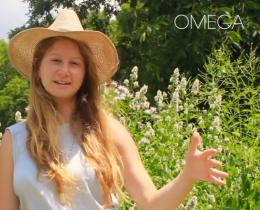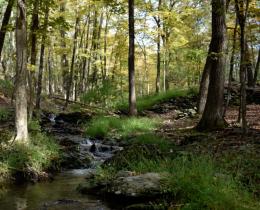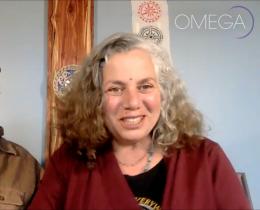Omega: What is forest farming? What makes it a unique way to connect people to the natural world?
Steve: Forest farming is where we maintain a healthy woodland ecosystem while producing food, medicine, and other goods that help sustain us. Many people feel a kinship or feel peaceful when they step into the woods. But there is a deeper intimacy when you are in a relationship with where your sustenance comes from—when there is a mutual exchange between a person and the woods. By sustaining yourself from the woods, you become intricately tied to the forest's long term well-being.
Omega: What is a simple project someone could do in their own forest?
Steve: Mushrooms are by far the easiest entry point. They create food, medicine, and healthy soil all in one action. They are truly the catalyst for changing our relationship to the forest. They are available to heal us, and heal the earth at the same time. There is no other living organism that offers us so much potential.
Omega: In your book, Farming the Woods, you talk about a variety of things that can be grown in the forest. What are some products that can be produced through forest farming that you don’t see in modern agriculture?
Steve: Almost any crop can be produced in modern agriculture, but you don't get the same quality. We are returning to an understanding that the way we produce food is critical to the amount of nutritional and medicinal value it has. A log-grown shiitake mushroom is an entirely different thing than a shiitake grown in a warehouse. You can see it, smell it, and taste it. The same goes for other forest-farmed crops, like elderberry. It’s a product of both the scale of the operation and the conditions in which it was grown. It’s not enough to be just "organic" or "natural." We need to move into "woodland grown" as a phrase familiar to all people.
Omega: You produce a wide variety of mushrooms at Wellspring Forest Farm & School. What are some nontraditional uses of mushrooms?
Steve: Mushrooms can be dried in the sun, which enhances their Vitamin D content. This is a vitamin we are often deficient in, especially in the colder parts of the world, where we can't synthesize Vitamin D from sunlight during the coldest months. Mushrooms can also be used in the production of extracts for medicinal purposes. These extracts release powerful compounds that offer treatment to some of the most pressing diseases we are challenged by today.
Omega: How is mushroom-based packaging created? Do you think it can help us reduce waste in the future?
Steve: Mushrooms are the fruit of an organism, which is made up of tiny fibers known as mycelium. Some mycelium isn't edible to humans, but can be used to grow materials. They are grown and then dried with heat to stop the growth and form a product. It's possible that someday all packaging could be from this type of process, and be completely biodegradable.
Omega: What is a natural biofilter and what it is used for?
Steve: Certain mushrooms, like oyster and stropharia, can be grown specially for the purpose of cleaning up polluted water. They literally digest hydrocarbons, ecoli bacteria, and other organic compounds. If we place them in the right place at the right time, we get clean water.
Omega: How do you think forest farming will evolve over the next 100 years?
Steve: I am glad you ask in terms of centuries! This is the mind of a forester. In 100 years, I would love to see our lands mostly in trees, but mixed forests, where we get more calories from chestnuts and hazelnuts and less from corn and soybeans. Where land stewardship and conservation are a byproduct of agriculture, and it's no longer an "either-or" scenario.
Omega: What has the practice of farming in the woods ultimately taught you?
Steve: That I am here on earth for a moment in time. The forest will continue on. The practice of farming in the woods is humbling, and gives one both the feeling of being small and being big.



